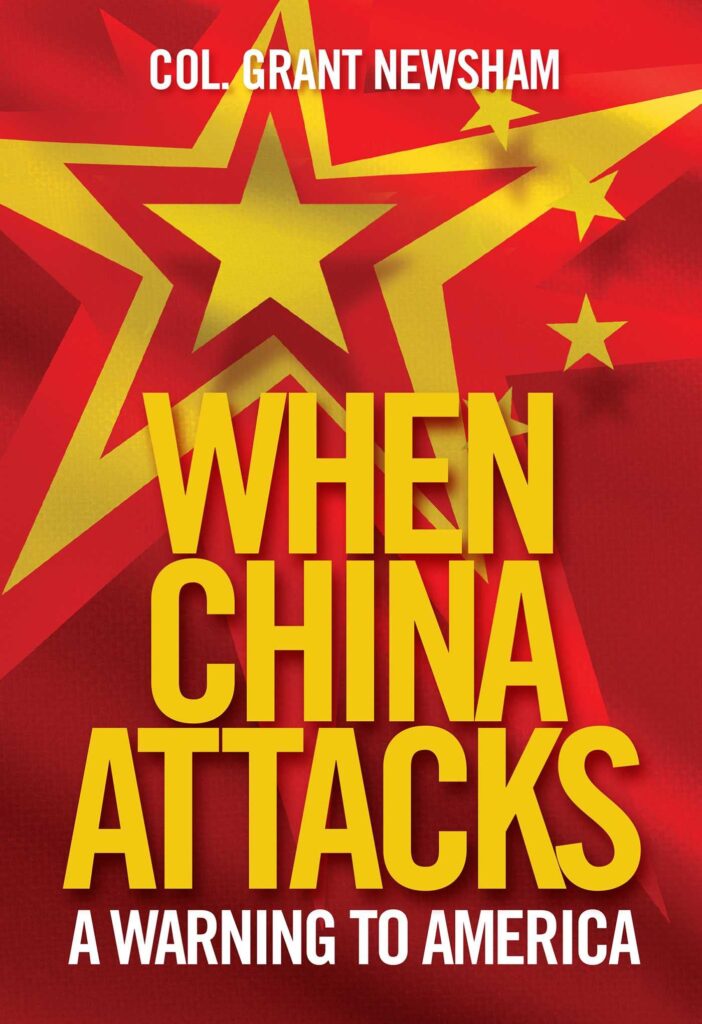CLEO PASKAL
 ‘When Beijing throws in the allure of money, they make short work of Wall Street and America’s business class—and academia as well.’
‘When Beijing throws in the allure of money, they make short work of Wall Street and America’s business class—and academia as well.’The recently released US best seller When China Attacks: A Warning to America starts with a description of what a devastating near-future attack on Taiwan might look like. But, even more disturbing, is its description of current results of the decades long political warfare attack that China has already waged on its perceived enemies.
In this edition of Indo-Pacific: Behind the Headlines, we speak with the book’s author, Col Grant Newsham (Retd). He was the first US Marine Liaison Officer to the Japan Ground Self-Defense Force, was instrumental in developing Japan’s amphibious capability and was, for over a decade, an executive director at Morgan Stanley Japan. He also served as the reserve G2 (intelligence) and G5 (plans and policy) at Marine Forces Pacific and was a US Foreign Service Officer specializing in insurgency, counter-insurgency, and commercial matters.
Q: How is an attack from China different than what the United States might be expecting?
A: It’s almost unrecognizable—not least because America’s ruling class has steadfastly refused to recognize it. The Americans tend to think a “war” only happens when both sides kind of agree to it—and shooting starts. And until that happens, it’s all just a misunderstanding—and there’s a potential for working things out. This reflects the American trait—indeed, conceit—that any problem can be resolved by talking.
Q: How bad is it getting in the US?
A: It’s bad. Consider that Chinese origin fentanyl killed about 70,000 Americans last year. 70,000 for crying out loud. And the US administration and government pretends China just can’t do anything about it. This chemical (or drug) warfare that the PRC is waging on us has been incredibly successful. It’s weakening the United States and causing immense social harm and economic costs. Just like “war” is intended. And the elites in China’s “main enemy”—the United States—refuse to admit China has anything to do with it.
That’s just one example.
Chinese communist biological warfare—which is effectively what Covid-19 was, even if it was seeded opportunistically—this time, at least—dealt a body blow to America. Beijing’s penalty for doing this? Nothing. And then there’s ongoing cyber warfare, economic warfare, financial warfare, and thoroughgoing proxy warfare—that has recruited many in America’s elite classes and ensured they’ll use their influence to lessen any potential “pushback” against the PRC.
When your enemy’s most influential people have convinced themselves you are not a threat—as China has done via its American proxies—one has to stand back in awe at what is a successful Chinese psychological warfare offensive.
Chinese economic warfare deserves special attention. Starting 40 years ago, but really “super-charged” from the 1980s and kept going after the PRC was allowed into the World Trade Organization in the early 2000s, America’s business and financial classes moved huge chunks of American industry and business to the PRC—“decoupling” American workers from their livelihoods and lives.
These fools built up the PRC economy and military into a force that could beat us, and weakened their own country in the process. And once again, the Chinese communists did it (or had us do it to ourselves) without firing a shot.
If it’s not “kinetic” warfare—the modern hip word what used to be called “shooting”, too many Americans just won’t admit it’s warfare. Indeed, until 2017, even US service members couldn’t refer to the PRC as an adversary—much less an enemy. Beijing must love all this.
And when Beijing throws in the allure of money—actual or potential—they make short work of Wall Street and America’s business class—and academia as well. And don’t forget how these “friends of China”—many who are part of the “donor class” have huge influence on Capitol Hill.
Q: Your subtitle is “A Warning to America”. You spent over two decades in Japan, have you seen similar things there?
A: Of course. It’s just as bad in Japan—at least among Japan’s ruling political and business classes. Japan’s Ministry of Foreign Affairs was long considered dominated by “pro-China” types. Even a number of Prime Ministers had far deeper ties with China than were healthy. Recall former Prime Minister’s Ryutaro Hashimoto’s Chinese girlfriend, and said to be an MSS agent too boot?
Some years back a prominent Japanese politician led a “study tour” to the PRC with dozens of Diet Members. You can imagine how they thought about China after they’d been shown a “good time”.
Japanese businesses also poured into China—without much concern for protecting technology. Indeed, Keidanren, the association of industry, has always been considered to be “pro-China” and a brake on any government efforts to recognize and deal with the PRC threat.
Japan’s military was also restrained from developing into a proper force that could actually defend the country. This was partly owing to Chinese influence and fears of “angering China”.
Unlike in the US, however, the Japanese public has always had a much better sense of the Chinese communists than has the “political class”. And the Japan Self-Defense Force at least recognized the PRC threat a good decade or two before American commanders finally woke up.
I once saw the commander of US Army Pacific belittle Japanese senior officers who tried to warn of the Chinese threat. This was a decade ago. It’s no surprise the US military is now fretting about how to handle the Chinese threat.
Q: Are other countries also being targeted in the same way?
A: Indeed. Just about every other country is the target of Chinese political warfare that includes the various types of “attack” that I’ve mentioned. The specifics may vary, but not the basics.
Of particular note is how Chinese commercial interests have made inroads into the Central and South Pacific. It’s a predictable pattern. Start with business and Chinese presence. This leads to political influence and a pro-China constituency in the local society. Eventually there will be a “security” component to this. As we’ve seen in the Solomon Islands recently, and to varying degrees in a number of other places: Djibouti, Cambodia, Myanmar, Sri Lanka, a number of Latin American countries and African countries as well.
China’s Belt and Road Initiative (BRI) is laying in the dual-use infrastructure that will allow the People’s Liberation Army to operate globally within a decade or so.
And the best part of the BRI from Beijing’s perspective? The Chinese currency is pretty much worthless overseas, but they’ve gotten the Americans to fund a good chunk of it. Thank you, Wall Street and US business.

Grant Newsham’s book
Q: What’s the difference between the approaches of State, the White House and Congress to China?
A: Parts of Congress are waking up to the PRC threat and some parts of it have always been awake. They haven’t been able to shape US policy towards the PRC in any meaningful—or necessary—way just yet. The donor class still prevails.
Note the Select Committee on China that’s meeting now, and headed by Congressman Mike Gallagher. This is a serious effort to expose the Chinese communist threat and to do something about it. Both Republicans and Democrats are involved.
But it is late in the day, and there’s still a number of representatives who oppose pushing back against China. Former representatives and senators seem worst of all. And there’s a former US ambassador to China who is practically a mouthpiece for PRC interests.
State Department? By and large, too often over the several decades I’ve been following this subject, the default approach to anything involving China is: “We don’t want to make China angry.” Or, “We need China’s cooperation with (fill-in-the-blank) so we must overlook whatever harmful thing they’ve done.”
The White House? It depends. This administration probably doesn’t scare the Chinese communists very much, if at all. The Trump administration did scare them—and it was the first one—Republican or Democrat—that did. The Chinese despised Pompeo, Pottinger, Stilwell, Yu, Navarro, and some others, and wanted them off the field. They got their wish.
But when the Chinese communists complain about something you pretty much know you’re doing something good and should do more of it. Keep in mind, that Chinese political warfare and influence in America was so wide ranging and longstanding that even the Trump administration faced a fierce internal fight between officials who wanted to defend US interests and other officials (i.e., Secretary of Treasury among others) who wanted to placate the PRC.
Q: Anything that we can learn from each other in how to fight back?
A: India knows all about this. Years ago, I remember retired Indian generals and admirals saying “We’ve been at war with China since 1962. Why don’t you Americans wake up?” They were right.
And they weren’t talking about only “kinetic” war. It’s unfortunate that America forgot about “political warfare”—and studiously refused to believe the Chinese communists meant us ill.
The US would do well to listen to the Indians—particularly the Indian military. One notes that Indian forces have been facing off against the enemy for decades. And if the Americans will learn no other lesson from the Indians than that “there is no deal to be cut with the Chinese” that would be progress.
Also, consider how the US is struggling to decide what to do about TikTok. It’s an obvious threat, but TikTok’s “white” lobbyists and lawyers (to include former prominent congressional staffers) are doing their best to ensure America cannot protect itself from pernicious Chinese influence. And this is just one dangerous Chinese “app”.
After the Indians and the Chinese came to blows on the border a few years ago, the Indian government immediately banned dozens of Chinese apps and took other measures against the PRC. Beijing screamed bloody murder—which is always a good sign it was effective.
Meanwhile, the US dithers. Indeed, the administration recently backed off on moves to delist Chinese companies from US exchanges on the grounds of inadequate corporate disclosure that every other company—US and foreign—must meet.
Putting it simply, the Indians seem serious. The Americans don’t.
Cleo Paskal is The Sunday Guardian Special Correspondent as well as Non-Resident Senior Fellow for the Indo-Pacific at the Foundation for the Defense of Democracies.
No comments:
Post a Comment